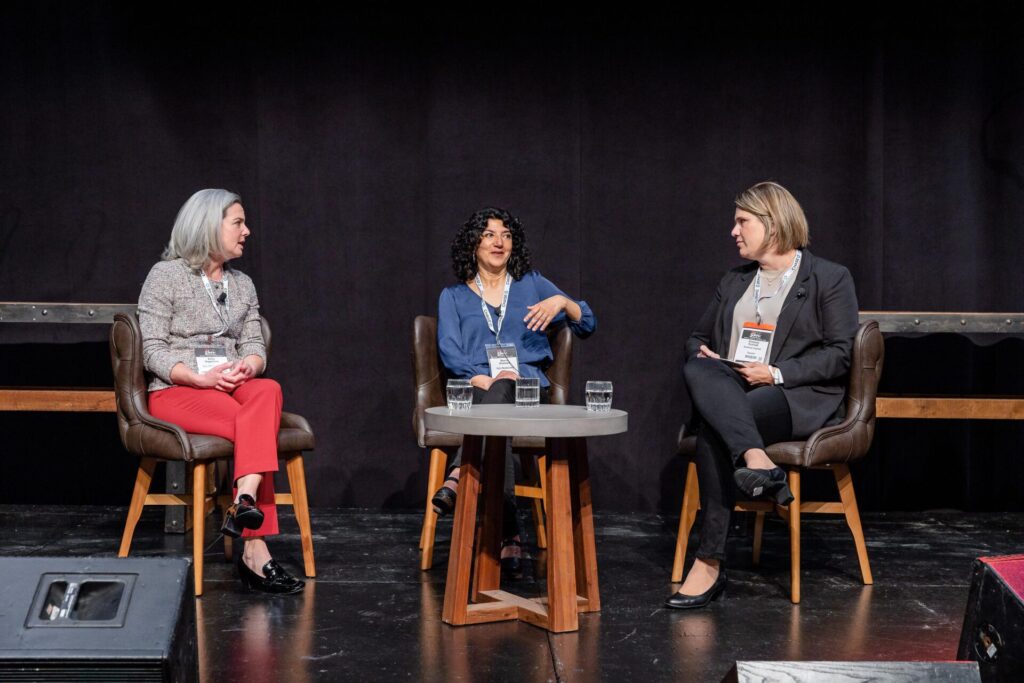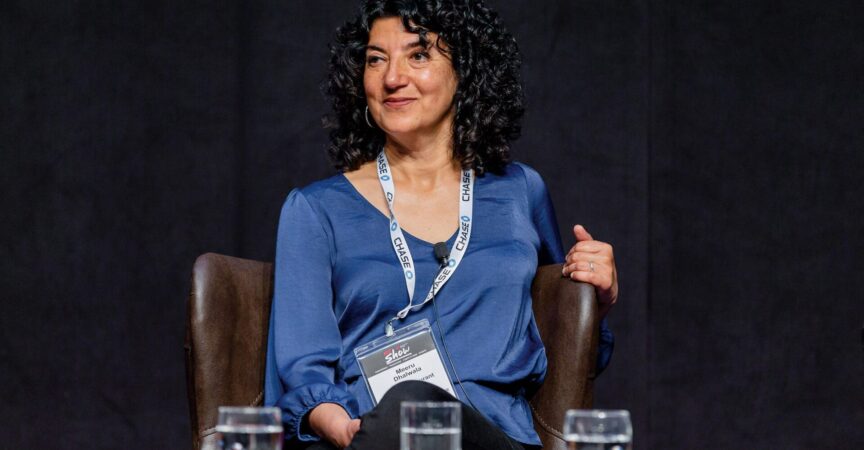Colouring Outside the Lines: MENU Q&A with Meeru Dhalwala
Chef, Cookbook Author & Co-Owner of Vij’s restaurant and My Bambiri organic baby food
What inspired you to be a part of the foodservice industry?
My entry into the restaurant industry was by accident and necessity. I have a Masters degree in Developmental Economics an I was working for an international non-profit organization on projects in Africa mostly. I met Vikram Vij and things moved quickly. I was in Washington D.C. and he was in Vancouver. He had just opened a 14-seat restaurant with all of his savings, so him moving to DC wasn’t an option. We figured I could easily find a job in Vancouver, so we got married and I moved to Canada on Feb 5, 1995! I didn’t have a work permit for the first three months and I hung out with Vikram at his work. I didn’t realize how hard it would be for me NOT to work and we really needed extra income. We needed more customers. So, at the age of 30 I taught myself how to use a knife. As soon as I could chop garlic and onions, I knew that cooking and creating my version of my Indian cuisine is where I now belonged. Vikram shined with customers and service and my passion for the cooking side was immediate. Because it was brand new—14 seats and just us—it was easy to add me.
Actually—I wasn’t given the chance, I grabbed it while it was dangling. I wasn’t waiting.
Being an entrepreneur has its challenges, are there challenges specific to being a female entrepreneur? How did you overcome them?
I’m not sure re: any type of entrepreneur, but yes there were many challenges of being an Indian and female chef/restaurant owner, especially in the 1990s, AND especially since I didn’t go through the traditional European- style training. I’m a self-taught woman- of-colour chef. In Canada, I identify as an immigrant and a woman. Both give me a source of strength as much as they gave me initial difficulties, which just make you stronger by overcoming them. I don’t use cookbooks and my techniques/combinations are my own. I couldn’t share personal stories about onions being thrown at me by the chef I was training under as an apprentice. I didn’t know how to work a line. I didn’t know fine dining restaurant etiquette. And I didn’t care to have onions thrown at me as a rite-of-chef-passage in the 90s.
I often felt as if other Vancouver chefs didn’t take me seriously. I was ignored or treated as Vikram’s outspoken/aggressive wife. It offended and hurt me at first, but then I have this wonderful channeling from my childhood that I do: I go inwards to myself. I focus on what I want and what’s important to me. I refuse to let myself get distracted. I had a full kitchen to myself with staff I had hired, and I had time to experiment, learn, create. I created my own kitchen cooking environment I needed so that I could thrive as well as our restaurant. All women. Give women a chance the way I was given a chance and see how beautifully they welcome it and strive.
Actually—I wasn’t given the chance, I grabbed it while it was dangling. I wasn’t waiting.
In hindsight, the male chefs of the 90s and early aughts just didn’t know much about Indian cuisine and there were no immigrant, female self-taught chefs. When Vikram and I won Best Asian Restaurant from Vancouver magazine in April 1995, I knew we were on our way to shine with Vij’s.
I grew up in the Washington D.C. area with Indian parents who spoke Hindi at home and cooked Indian food. But everything else about my life outside the home was American. We arrived in the U.S. in winter 1969. There were Black kids and White kids. No Brown kids at school. I was teeny tiny in comparison and the only ESL kid when there was no ESL. I was often asked to identify myself as either Black or White. I was never taken seriously. I learned to navigate my “being” while making friends and while being teased.
So, I entered the workforce with a deep self-confidence that often got shaken at the shallow level. And I recognized that shallow will always pass.”
What do you see as the most exciting new opportunities in the industry? What are your predictions for the sector’s future?
We restaurants can take climate change – in terms of agriculture, fisheries and animal husbandry – to a meaningful, skyrocketing level. The foods we eat, how they are grown/ produced/fished/raised and food waste = 25% of all greenhouse gases. In addition to being entrepreneurs, chefs are creators and we can lead our customers. I don’t enjoy just pleasing my customers, I see myself as an expert of food and food issues around me, just as GPs see themselves as experts on their patients’ health issues. The more delicious and different foods I create, the stronger my pedestal to be a leader in climate change. It’s not enough to earn money anymore.

Meeru Dhalwala Menu Q&A
I like partnerships of two. The financial, bookkeeping and customer service side isn’t something I particularly enjoy. I love human resources. I love doing family or climate change-focused community cooking events, not TV competitions. I love being holed up with my kitchen staff. Vikram and I divide according to our strengths and trust the other to do their job.
The pandemic created opportunities for collaborative ventures in new products/ services that consumers are more open to trying. Has this created more space for female entrepreneurs? How can women take advantage of the opportunity?
Yes, for sure. Over the past two years people ate at home way, way more and found creative ways to eat at home—not just take-out from restaurants. People had to find ways to occupy their time at home. Plus, most people no longer want to cook meals completely from scratch, but want to add shortcuts and complements. There has been a bigger health focus during the pandemic, especially amongst the 20–30 year-olds. Healthy, quick energy foods vs. snickers bars. I was recently a judge for the From the Ground Up a new food show here in B.C. and I judged 33 new food and beverage products for home consumption—sauces, marinades, energy snacks, low sugar, gluten free, healthy fats. I’m surprised and delighted by the health focus as well as the focus on sourcing.
Women are still taking more responsibility for child rearing and most likely pet care. Creating food products in shared, rented commercial kitchens gives us so much more flexibility. We can own our brands and businesses from home and small kitchen rentals. AND as women gain more equality of income, we gain our rightful status as consumers, so more products will be designed and created for us. I believe that women tend to be more collaborative partners in business and many prefer partnerships over solo ventures. In partnerships, we have more time to focus on home.
What has been the most difficult obstacle to overcome? Does the obstacle still exist for entrepreneurs?
Entrepreneurs need to figure out their balance of creating, leading, navigating and resilience on one side, with listening, learning and paying attention to staff and customers on the other. Now, women need to add to this: expressing ourselves with confidence in who we are, versus trying to blend in with “the guys”. For example, we grew quickly at Vij’s and, before I knew it, we had a management team that met every week: me and three men. The men get loud and animated and raised their voices in disagreement—sometimes even banged their hands on the table in frustration. When I get frustrated, stretched and stressed, I get watery-eyed and teardrops roll down my cheeks. This was seen as a weakness. I even saw one manager roll his eyes at my one tear—as if the patience required to put up with my one tear was a waste of his time. So, I made it a point to announce to our management team that, as a woman, I express my frustrations and stresses via a few tear drops and they are to respect my ways. Otherwise, if they are willing to stop raising their voices, yelling or banging and shutting me down before I finish my sentence, then I too am willing to work at not tearing up. We women get to define what is perceived as our strengths and weaknesses. My motto I learned from my mother, in order: Firm, Kind, Respectful. Practice this and you will get way more back from your staff and customers.
What mistake have you learned the most from?
I react too quickly sometimes. I don’t let things that need to sit within me for a while actually sit. I want a resolution faster than the situation and people are ready to move. I rush people emotionally.
Can you describe the moment you knew you were going to be successful in this field?
I moved to Vancouver in February 1995 and, with no experience, took over the kitchen of a 14-seat restaurant. In April 1995 we won “Best Asian” restaurant from Vancouver Magazine. Granted there weren’t as many Asian restaurants around back then, but it was a big deal and I knew the newly formed Meeru-Vikram team was going to be a success.
What should the next wave of new entrepreneurs know about starting their own business?
Figure out how you can best be “you” as an entrepreneur-human being. Many bosses see employees based on how they can best serve the business. Many bosses see customers as “cha-ching”. Because they take on the financial, emotional and physical stresses of starting their own businesses, it becomes all about them. And this is understandable. But this isn’t the best way to keep staff motivated and emotionally invested. Figure out how you work best in terms of your strengths and what you enjoy doing. Otherwise, you burn out or become cold. I know that I am not a solo entrepreneur. I like partnerships of two. The financial, bookkeeping and customer service side isn’t something I particularly enjoy. I love human resources. I love doing family or climate change-focused community cooking events, not TV competitions. I love being holed up with my kitchen staff. Vikram and I divide according to our strengths and trust the other to do their job.










I am my cousin Penny enjoyed an evening at Deerhurst a resort in Ontario last Saturday.
The Vij family chicken curry dish came out after it was torched.
The aroma emitting from the dish was intoxicatingly delicious.
What spice was being elevated with the torch?
Thank you